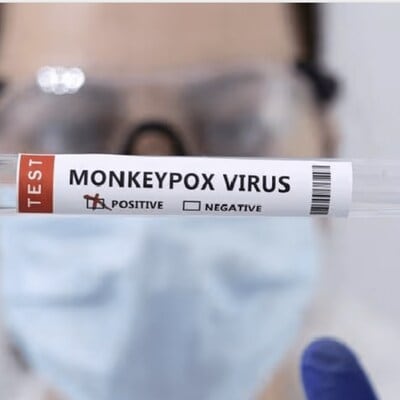Two days after the World Health Organisation (WHO) classified the viral infection “mpox” as a public health emergency of international concern (PHEIC) because of a sharp rise in cases across Africa, both central and state governments in India have scrambled into action. High-level meetings are underway, and new guidelines have been issued to try to prevent the virus from spreading.
“The central government has called for a meeting with health experts and officials of hospitals under its control,” said a senior official at a leading central hospital.
In Tamil Nadu, the Directorate of Public Health (DPH) has ordered health officials across the state to be on high alert. Strict screening protocols are to be implemented for passengers arriving from central African countries affected by the outbreak. In an advisory, the state’s Director of Public Health T S Selvavinayagam instructed health officials to familiarise themselves with the clinical presentation of mpox and to scrutinise the travel histories of any patients who have visited the affected regions in the past 21 days.
“A person of any age having history of travel to affected countries within the past 21 days presenting with an unexplained acute rash and one or more of symptoms, such as swollen lymph nodes, fever, headache, body aches and profound weakness, should be suspected of mpox”, the circular stated.
Both Hyderabad and New Delhi — cities that are popular among African students pursuing higher education — have also been placed on heightened alert following reports of the disease’s spread globally.
Concerns regarding mpox infection mounted in India after at least three patients with mpox virus were found in Pakistan’s Khyber-Pakhtunkhwa province, bordering Afghanistan. The European Centre for Disease Prevention and Control has raised its risk level for mpox, a day after global health officials confirmed one case of infection with a new strain of the virus in Sweden, the first outside Africa in its latest spurt.
China has announced plans to screen both people and goods entering the country for mpox virus over the next six months.
The Ministry of Health and Family Welfare (MoHFW) previously issued an advisory in 2022 stating that mpox is a viral zoonotic disease with symptoms similar to smallpox but with less severe clinical outcomes. It is caused by the monkeypox virus, first identified in 1958 after monkeys used in research developed a pox-like illness. The virus has two distinct subtypes: The more virulent Clade 1, endemic to the Congo Basin in central Africa, and the less severe Clade 2, which is common in West Africa.
The global mpox outbreak, which started in 2022, involved the Clade 2b variant and resulted in around 140 deaths worldwide. However, in 2024 alone, a resurgence of the Clade 1b subvariant has been reported, with 17,500 cases and 460 deaths in Africa.
Speaking on the availability of vaccines, Dr Satish Koul, senior director and head of Internal Medicine at Fortis Memorial Research Institute in Gurugram, pointed out that vaccines used for smallpox and chickenpox could also prove effective against Mpox, as the viruses belong to the same family.
Speaking on the availability of vaccines, Dr Satish Koul, senior director and head of Internal Medicine at Fortis Memorial Research Institute in Gurugram, pointed out that vaccines used for smallpox and chickenpox could also prove effective against Mpox, as the viruses belong to the same family.
Indian children are routinely vaccinated against chickenpox with the varicella vaccine, which is administered between 12 and 15 months, followed by a booster shot between the ages of four and six.
Reports suggest that Danish pharmaceutical company Bavarian Nordic is seeking European approval to use its mpox vaccine, IMVANEX, for children aged 12 to 17. It is currently only approved for adults over 18.
Koul cautioned that the risk of an mpox outbreak in India is higher now than it was during the Covid-19 pandemic, due to the lifting of travel restrictions.
Commenting on the disease’s mode of transmission, Dr Rajeev Gupta, director-internal medicine at CK Birla Hospital in Delhi, explained that mpox causes an acute febrile illness characterised by a rash. The virus spreads through direct contact with an infected person or their belongings, such as linens, towels, and handkerchiefs.
“The virus can also be transmitted through kissing and sexual contact, especially among men, and there have been reports of transmission from mother to foetus. Additionally, it can spread through respiratory droplets, particularly during sneezing, coughing, or loud speaking,” Gupta said.
He added that to avoid infection, people should steer clear of direct and indirect contact with infected individuals, wash their hands regularly, use hand sanitiser, and wear surgical masks.
What are the symptoms?
The symptoms can be seen between 1 and 21 days after exposure. Common indicators include rashes, fever, sore throat, headache, muscle ache, back pain, low energy and swollen lymph nodes.
Are vaccines available?
There are at least two vaccines currently in use for mpox, recommended by the WHO’s Strategic Advisory Group of Experts on Immunisation. While they are not available in India, experts suggest that those who are vaccinated against smallpox or chickenpox are immune to mpox.
First Published: Aug 16 2024 | 8:15 PM IST
